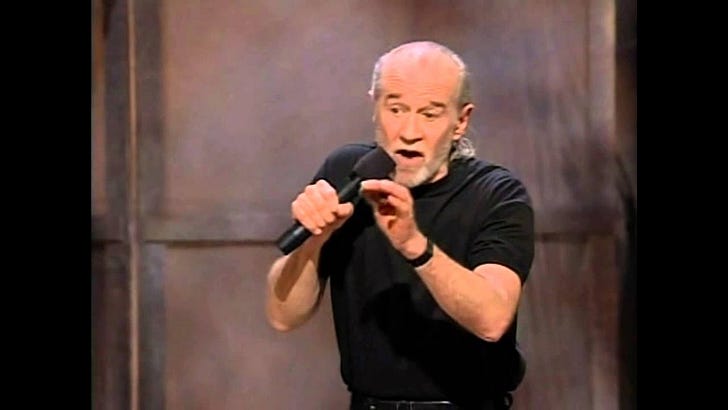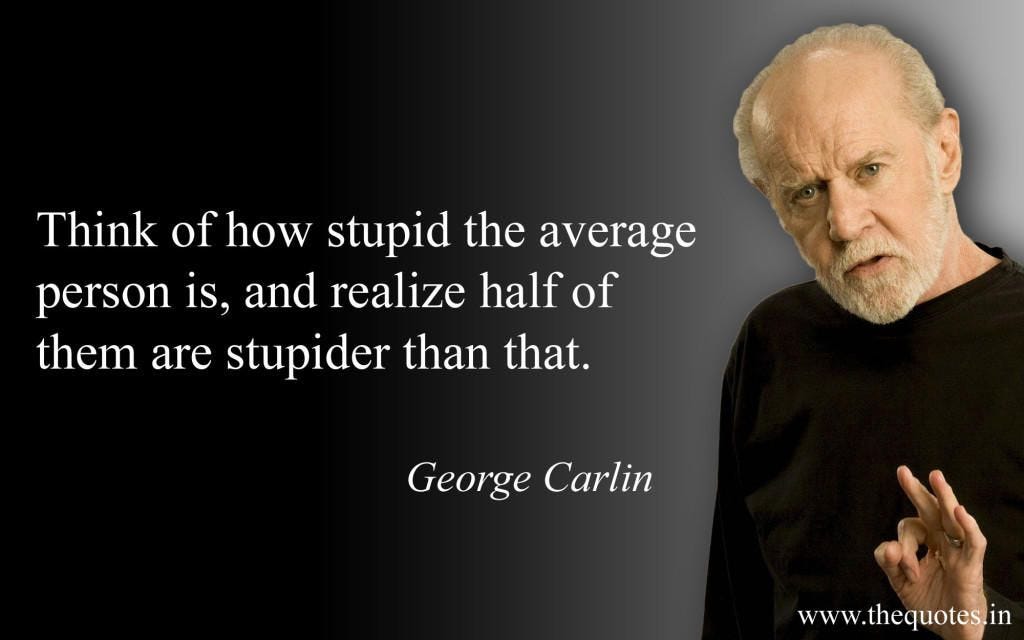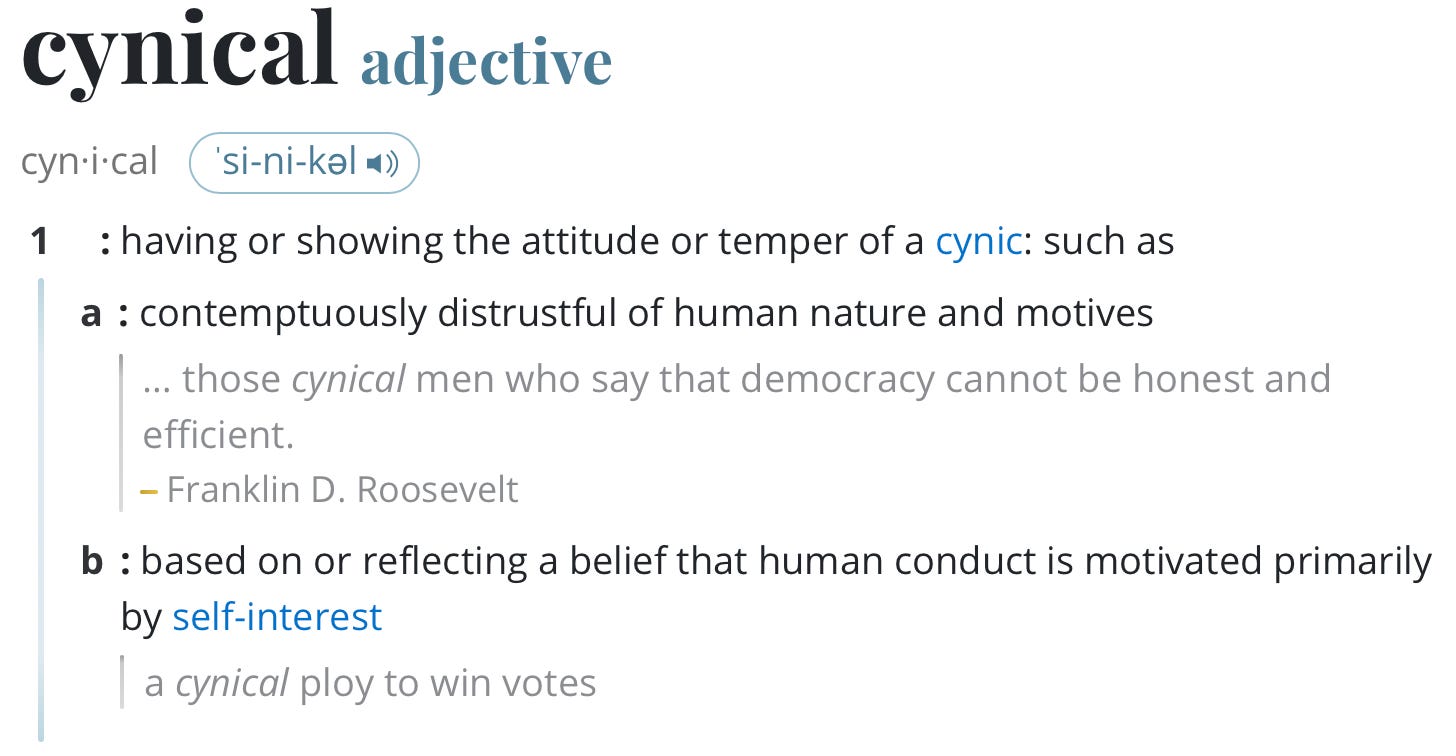Has Working Too Much Online Since 2009 Warped My Worldview Beyond Hope?
Maybe Excessive Social Media for Too Long Has Screwed Me Up Permanently
In my last two autobiographical essays of cultural criticism I laid out how my experiences of violent trauma and emotional bullying have caused me to develop a perhaps overly eccentric worldview and creative approach, both of which can be off-putting to many people. First, I explained how the experiences of going through junior high and high school in Carmel, Indiana deeply traumatized me. Then I laid out how the PTSD which I’ve struggled with for a year has often left me in a state of “hyperarousal” perceiving too much, too intensely, and then expressing myself too loudly, sometimes with too much emotion.
Today with the seemingly perpetual news story of the drama around Elon Musk’s purchase and overhauling of Twitter, I’m starting to wonder if there might be something else that may have contributed to turning me into such a Grinch.
The George Carlin routine at the start of this post has been a mantra of sorts to me since last year. The “Garbage In, Garbage Out” image above has even been my banner on Twitter.
After the surprise deaths of two colleagues a month apart and then the trauma of the violence I experienced in September I really needed to cheer myself up. So I dove into the comedy specials of Carlin, watching a DVD box set with them all. And not only did I find the laughs I needed, but I also came to understand his philosophical journey as he evolved from the late ‘70s through until his death in 2008.
The comedian who had made his name with the “7 dirty words you can’t say on television” bit evolved into an often dark comedic voice in his old age, regularly boldly proclaiming sometimes disturbing takes on politics, culture, and humanity as a whole.
My personal favorite is his explanation for why he no longer votes or spend much time complaining about lousy politicians. According to Carlin the reason our politicians are so terrible is because, simply, the American public itself is terrible. Most people suck. The majority of people in this country are self-interested, lazy, and obsessed with all sorts of meaningless crap. So of course our politicians would be too. People want to vote for someone “they can have a beer with” - AKA, someone as dumb as they are.
I guess you could say I’ve become “cynical” according to the commonly understood definition:
Now some of this is certainly due to the factors I’ve already written about - the violence I’ve experienced at various points in my life. But now I’m wondering too if there’s been some other form of slow motion trauma which has also caused me to become so distrustful and weary of my fellow humans.
Since 2009, when I left the job where Sally and I met initially as co-workers, I’ve basically lived online. Writing, editing, and researching stuff on the internet has been my full-time job in a variety of capacities. From 2009 through 2015 my two editorial jobs were largely dependent on my ability to figure out how to generate web traffic for new articles and opinion blog posts. From 2015 through 2020 I spent God-knows-how-much-time tracking the online activities of radical Islamic activists here and around the globe. I spent years focused on researching the deep weeds of anti-Israel activity on Wikipedia. And for several years now I’ve been writing Zionist tweets and Facebook posts. Monitoring the various ideological struggles online has been my job and it really still is. Everyday, all day I’m digging into media of all sorts to try and understand what’s going on around the world and how people are arguing about it.
And honestly, the experience of it has really soured me on humanity as a whole. I feel like I’m perpetually immersed in stories about war, crime, hatred, corruption, and general cruelty.
The question I have to ask myself at this point, though: has my online existence really enabled me to see the world “as it is” or have I been getting poisoned by an algorithm-driven distorted version of reality?
One of my favorite writers I’ve discovered recently on Substack goes by the pseudonym Gurwinder and he had a very compelling post about how social media has ratcheted up the political and cultural tensions:
starts by describing a phenomenon which has annoyed me as I’ve observed it spread over the last few years in my former stomping grounds of American right-wing media: many people seem to think an actual civil war is coming. I’ve dismissed this for many reasons, most particularly: what issue is significant numbers of people willing to pick up guns and shoot their countrymen to settle? There’s literally nothing as divisive and clearly regional in nature as slavery was before the civil war. So I agree with Gurwinder’s thesis:Social media is having a much stranger effect on people than merely pushing them toward war; it's convincing them they’re headed for war when in fact they aren't. And among the victims of this corrosive delusion are countless influential opinion-makers, as well as everyone influenced by them.
He then drops some intriguing statistics about just who has been raising the temperature online in political discussions:
Indeed, a 2021 Pew survey of 10,000 US social media users found that only 9% of people shared or posted political content online. “Bashing the fash” or “owning the libs” simply wasn’t something the average person cared about.
This is something I’ve been acutely aware of since starting my misguided career as an ideological operative in 2009. I still lived and operated enough in the “real world” to see that the vast majority of people didn’t seem to care about the Left vs Right “war” which my friends and I were perpetually fighting from our keyboards.
Gurwinder notes another factor which I quickly became very aware of working with and amidst a coterie of big ego writers and self-important activists:
Research suggests narcissists are more likely to be political activists. Further, the narcissistic trait of entitlement is linked to political correctness and alt-right attitudes, and may therefore help explain both the woke and the red-pilled, manifesting as either a victim-complex (“Look at me, I’m being censored/discriminated against!”) or a savior-complex (“Look at me, I’m standing up to the groomers/bigots!”)
Now, here's the thing: research suggests that people with narcissistic traits are more likely to use social media, and more likely to have social media clout. A meta-analysis of 62 studies (N = 13,430) found that narcissism was positively correlated with time spent on social media, frequency of tweets, and number of followers. Narcissists likely find social media a useful (and addictive) way of acquiring the social validation they so deeply crave.
So who’s responsible for provoking most of the online conflicts?
According to a meta-analysis of eight studies (N = 8,434), online political discussions attract superficial, status-driven people who act as horridly online as they do offline. This finding was corroborated by a large study of 36,000 communities on Reddit, which found that less than 1% of communities start 74% of conflicts.
Gurwinder explains how the presence of more narcissists than usual and the rewarding dynamics of social media thus makes it appear that humanity as a whole is worse than it may be:
Social media both attracts and amplifies dramatic, narcissistic people, making them seem far more representative of humanity than they really are. Just as a magnifying glass focuses diffuse sunlight into a blistering beam, so Twitter focuses background chatter into the clamor of war. What we see on our feeds and in our replies is not reality but a dramatization of it, a tragic tale played by a cast of keyboard warriors and perpetual victims that eventually leaves us hopeless and exhausted.
Given this toxicity and distorting effect of reality on social media, should one abandon it altogether? Gurwinder doesn’t think so and he concludes his article laying out how one can still use Twitter in a positive way - just block and mute liberally and be careful to filter who you’re following. Social media is what you make of it.
I’m hesitant to leave Twitter also. It’s just a very useful tool for connecting with people of diverse views all over the world. It’s great for finding information from everywhere that may not have bubbled up into the mainstream narrative talked about on the cable chat shows and the evening news with Lester Holt.
But social media could certainly be fixed not to exacerbate these problems so much. And the best prescription for doing so comes from a recent Medium article by Doug Rushkoff, the living thinker who has most influenced me over the last 20 years: “If I Were CEO of Twitter.”
Rushkoff lays out four ideas to fix Twitter:
First, I’d scrap the algorithm. The algorithm is all the programming that decides what ends up in a person’s feed, what posts to boost to whom, how to determine what is trending, and how to direct ads to whom. I wouldn’t change it, tweak it, or adjust it. Just scrap it…
Second, I’d have the company accept responsibility for itself as a publishing platform. Instead of Musk’s content moderation council or user polls, I’d put significant resources — maybe 50% of the company’s budget — to an editorial department to exercise what we used to call “journalistic standards and practices.”…
Won’t this make for a less profitable company? Actually, no. Especially if Twitter implements my third proposal, which is to shift from a growth-based enterprise to one that emphasizes ongoing revenue and profit. (If that doesn’t make sense, read my book Throwing Rocks at the Google Bus: How Growth Became the Enemy of Prosperity )…
Fourth, I would try to shift the editorial and ownership structure to a commons-based or even a DAO ( basically, a blockchain organized enterprise) variation on Reddit, Metafilter, or Wikipedia. Community editors participate as moderators and content regulators, with their activity measured and rewarded with a stake in platform ownership and governance.
So, apart from what Gurwinder points to - political narcissists’ attraction to social media for rewarding their bad behavior - what does Rushkoff identify as the big picture reason for how social media has become so toxic? The biases innate in corporate tech culture. For so many technology companies from Amazon to Facebook to Uber the goal for so long was not creating a great, viable, stable product that helps people, but to grow as fast as possible. “Move fast and break things” was the mantra of the era. But it wasn’t always things getting broken by our new technologies - it was people.
Did too much social media break me too? Maybe, but I’m not entirely sure.
Much of what Gurwinder identifies I’ve been cognizant of since I started using social media in a professional capacity. I knew that there were more narcissistic people than usual among the activist class, and I figured out early on that social media was often intentionally trying to inflame me and others in order to keep us returning to these platforms and staying longer. I even engaged in it some myself when it was my job to “boost traffic” at NewsReal Blog and PJ Media. I knew early on that a provocative article intended to push people’s buttons, with a snappy, emotionally-twisting headline would grab more readers than something more restrained. And I’ve even employed such tactics to grow this substack since we launched in July. Behold the two most popular articles we’ve published:
HiBut I have to give credit where credit is due. I think much of the reason why I didn’t fall prey for the deceptions of social media is because I’ve been reading Rushkoff so closely for years. He was sounding off on this stuff back when I was editing the right-wing blogs. His Program or Be Programmed: Ten Commands for a Digital Age came out in 2010. Present Shock: When Everything Happens Now arrived in 2013. These books and the articles Rushkoff was putting out at the time even convinced me to get off Facebook for a year and a half. I only got back on when I started searching for new authors for the publishing start-up I joined in 2015, Liberty Island Books.
And even then I’d learned not to keep the Facebook app on my phone. I only used Facebook the old fashioned way - when on my computer - and justified it as simply “part of my job.” I still don’t have Facebook on my phone, and now I’m often tempted to remove Twitter too so I don’t waste so much time getting drawn into dumb “debates.”
So has all this time I’ve spent making a living and engaging in “activism” on the internet twisted my view of reality? Or am I really seeing the darkness and evil of humanity with clarity?
While I’m open to evidence disproving my cynicism, I still lean toward the latter. And the ultimate reason for that isn’t that I’ve taken in too much news, obsessed over Islamists too long, or gotten into too many arguments with crazed nut jobs on Twitter. I see my cynicism as Biblically-justified:
Jeremiah 17:9: “The heart is deceitful above all things, and desperately sick; who can understand it?”
Isaiah 1:4-10 Ah! Sinful nation, people laden with wickedness,
evil offspring, corrupt children!
They have forsaken the LORD,
spurned the Holy One of Israel,
apostatized,
Why would you yet be struck,
that you continue to rebel?
The whole head is sick,
the whole heart faint.
From the sole of the foot to the head
there is no sound spot in it;
Just bruise and welt and oozing wound,
not drained, or bandaged,
or eased with salve.
Your country is waste,
your cities burnt with fire;
Your land—before your eyes
strangers devour it,
a waste, like the devastation of Sodom.
And daughter Zion is left
like a hut in a vineyard,
Like a shed in a melon patch,
like a city blockaded.
If the LORD of hosts had not
left us a small remnant,
We would have become as Sodom,
would have resembled Gomorrah.
Hear the word of the LORD,
princes of Sodom!
Listen to the instruction of our God,
people of Gomorrah!
1 Corinthians 2:14 The natural person does not accept the things of the Spirit of God, for they are folly to him, and he is not able to understand them because they are spiritually discerned.
As I laid out in part 14 of my ongoing series on antisemitism and culture:
And so one of the big conclusions I’ve developed over the years about antisemitism is especially unpleasant: I don’t believe antisemitism is ever going to go away and in fact I anticipate it only getting worse in the coming years.
Why? Because the three general reasons for antisemitism above and symbolized in the biblical characters Lipman highlights, are innate to human nature. It is natural for humans to worship sex and the other powers of the natural world. It is natural for humans to covet their neighbor’s wealth and seek to take it from them. It is natural to despise the other nearby tribe and see them as a threat rather than family.
So yes: antisemitism is natural. It is normal to embrace the primitive cultural values which then lead one to scapegoat a whole group of people.
Given that I opened this post with a great George Carlin bit I suppose I’ll close with another. This one is from his final special, 2008’s It’s Bad for Ya, released as this social media nonsense was just starting to emerge. It should remind us that the bullshit ideas commonly embraced by most Americans go way back:









